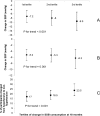Reducing consumption of sugar-sweetened beverages is associated with reduced blood pressure: a prospective study among United States adults
- PMID: 20497980
- PMCID: PMC2892032
- DOI: 10.1161/CIRCULATIONAHA.109.911164
Reducing consumption of sugar-sweetened beverages is associated with reduced blood pressure: a prospective study among United States adults
Erratum in
- Circulation. 2010 Jul 27;122(4):e408
Abstract
Background: Increased consumption of sugar-sweetened beverages (SSBs) has been associated with an elevated risk of obesity, metabolic syndrome, and type II diabetes mellitus. However, the effects of SSB consumption on blood pressure (BP) are uncertain. The objective of this study was to determine the relationship between changes in SSB consumption and changes in BP among adults.
Methods and results: This was a prospective analysis of 810 adults who participated in the PREMIER Study (an 18-month behavioral intervention trial). BP and dietary intake (by two 24-hour recalls) were measured at baseline and at 6 and 18 months. Mixed-effects models were applied to estimate the changes in BP in responding to changes in SSB consumption. At baseline, mean SSB intake was 0.9+/-1.0 servings per day (10.5+/-11.9 fl oz/d), and mean systolic BP/diastolic BP was 134.9+/-9.6/84.8+/-4.2 mm Hg. After potential confounders were controlled for, a reduction in SSB of 1 serving per day was associated with a 1.8-mm Hg (95% confidence interval, 1.2 to 2.4) reduction in systolic BP and 1.1-mm Hg (95% confidence interval, 0.7 to 1.4) reduction in diastolic BP over 18 months. After additional adjustment for weight change over the same period, a reduction in SSB intake was still significantly associated with reductions in systolic and diastolic BPs (P<0.05). Reduced intake of sugars was also significantly associated with reduced BP. No association was found for diet beverage consumption or caffeine intake and BP. These findings suggest that sugars may be the nutrients that contribute to the observed association between SSB and BP.
Conclusions: Reduced consumption of SSB and sugars was significantly associated with reduced BP. Reducing SSB and sugar consumption may be an important dietary strategy to lower BP.
Clinical trial registration: URL: http://clinicaltrials.gov. Unique identifier: NCT00000616.
Figures

Comment in
-
Hypertension: Reducing intake of sugary drinks decreases blood pressure.Nat Rev Nephrol. 2010 Aug;6(8):444. doi: 10.1038/nrneph.2010.88. Nat Rev Nephrol. 2010. PMID: 20690199 No abstract available.
References
-
- Rosamond W, Flegal K, Friday G, Furie K, Go A, Greenlund K, Haase N, Ho M, Howard V, Kissela B, Kittner S, Lloyd-Jones D, McDermott M, Meigs J, Moy C, Nichol G, O'Donnell CJ, Roger V, Rumsfeld J, Sorlie P, Steinberger J, Thom T, Wasserthiel-Smoller S, Hong Y, American Heart Association Statistics Committee and Stroke Statistics Subcommittee Heart disease and stroke statistics--2007 update: a report from the American Heart Association Statistics Committee and Stroke Statistics Subcommittee. Circulation. 2007;115:e69–171. - PubMed
-
- Kearney PM, Whelton M, Reynolds K, Muntner P, Whelton PK, He J. Global burden of hypertension: analysis of worldwide data. Lancet. 2005;365:217–23. - PubMed
-
- Bray GA, Nielsen SJ, Popkin BM. Consumption of high-fructose corn syrup in beverages may play a role in the epidemic of obesity. Am J Clin Nutr. 2004;79:537–43. - PubMed
-
- Bleich SN, Wang YC, Wang Y, Gortmaker SL. Increasing consumption of sugar-sweetened beverages among US adults: 1988–1994 to 1999–2004. Am J Clin Nutr. 2009;89:372–81. - PubMed
-
- Berkey CS, Rockett HR, Field AE, Gillman MW, Colditz GA. Sugar-added beverages and adolescent weight change. Obes Res. 2004;12:778–88. - PubMed
Publication types
MeSH terms
Substances
Associated data
Grants and funding
LinkOut - more resources
Full Text Sources
Medical

